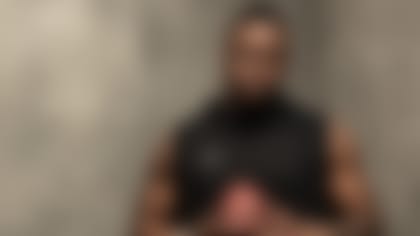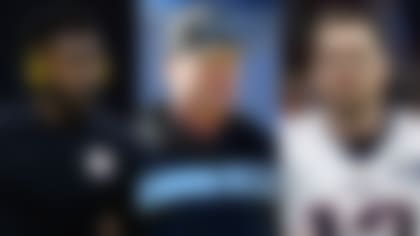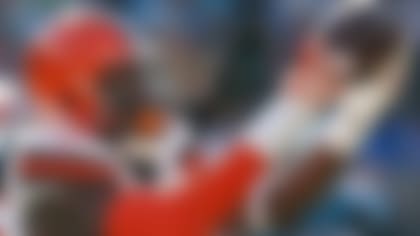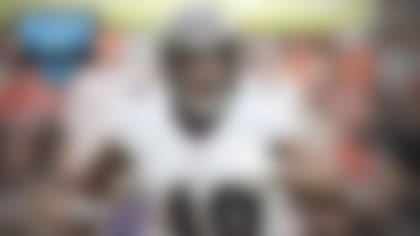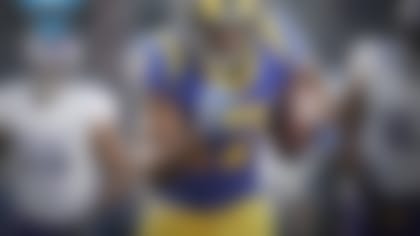NFL Media's Oklahoma Drill series presents exclusive, quick-hitting one-on-one interviews with players and coaches from around the league. No nonsense -- just football experiences directly from the source.
Marlin Briscoe
Quarterback/Receiver, Retired
Born: Sept. 10, 1945
Experience: Nine seasons
Interview by Tom Blair | Feb. 16, 2017
[I] didn't really realize the significance of [being the first black starting quarterback in modern pro football history] at the time, because I never thought of myself as a black quarterback. I was always a quarterback, I just happened to be black. And to be able to pull it off and be a linchpin for the black quarterbacks after me, and a plethora of so-called "black quarterbacks" -- you don't hear that phrase, "black quarterbacks," anymore; they're basically quarterbacks. But to be the one that set the tone, I'm very proud of that.
When Ebony magazine did about a six-page spread on me, I realized the importance and the significance to be successful. So the naysayers of the world and, I'm sorry to say this, the racists of the world had to let go of that mentality of [the] superiority of white quarterbacks at that position.
I often say that there is a pecking order ... Jackie Robinson had to be the first to do what he did in order for there to be a black quarterback. And then, to have a black president, there had to be a black quarterback before a black man could become president. ... 'Cause it couldn't happen in the reverse order.
I started out wanting to be a quarterback in Pop Warner. That's how I started organized football back in Omaha, Nebraska. And in my neighborhood, when we would play tackle football or flag football, they would always let me play quarterback, 'cause I was the only kid that could throw, even though I was the youngest one out there.
When I went to try out, the coaches said, "OK, wide receivers over here, defensive backs over here, running backs over here, tackles over here, linemen over here, quarterbacks over here." So I went and stepped into the quarterback line. And the coach -- I never will forget him, because he was such a fair man -- he came over to me and said, "Well, son, don't you want to go in the running back line? Or what about going to wide receiver or a different position?" I said, "No, sir, I want to go in the quarterback line." He said, "OK, go ahead." He saw me throw the ball and he said, "You got a good arm. You're gonna make a good quarterback." And that's how it happened.
You know how when you're in elementary school, teachers would always ask you, what do you want to be when you grow up? Well, not a black kid that I ever have known, including myself, would say, "I want to be the president of the United States." A lot of the white kids, they said, "Well, I want to be the president." That was something that we never even considered. Because it didn't exist in black life, to stand up and say, "I want to be the president of the United States." If we did, they would probably send us to detention. And that was basically the same way with black quarterbacks.
I grew up in a melting-pot environment. Back when I was growing up, the packing houses flourished, so there were a lot of different ethnic groups that came ... In sports or otherwise, I was always in an environment where wherever I was going to compete, whether it be academic, sports, social things, I did so with other ethnic groups. So that boded well for me on every level ... You had to get along and coexist with all different types of people.
When Denver came to scout me, they said that they were looking at me as an athlete, like they did all black quarterbacks. If they looked at you as an athlete, not a quarterback, that gave them an excuse to change your position. ... And so my coach told me that Denver was one of the only teams in the league that held their practices before the media and the fans. So he told me they were going to draft me as a defensive back, and I told 'em, "OK, I'll play defensive corner, but I want a three-day tryout at quarterback." I negotiated my own contract. And they looked at me like I was crazy ... Most 14th-round draft choices don't even make the team, let alone mandate that you wouldn't play unless you got a three-day tryout.
Anyway, during that three-day tryout, there were eight quarterbacks, and we would each get a certain amount of throws: long-range, medium-range and short-range. And I was always the eighth. So when it came time for me, I didn't get the amount of throws that the other quarterbacks got. I knew this was going to happen. You know, we're talking about the '60s, when black life was in a state of flux and denial ... So when it was my turn to make the different throws, I made sure that I was on-point, on-target. And when it got to the longer throws, I'd wait 'till the receiver got a little further out than normal, and I would -- not bragging, but I had a strong arm, and they thought it was out of reach, and it was on-target.
One guy said, "Man, you got an ooh-wee arm." I said, "What?" He said, "Yeah, as in, 'Oooooh-whee!' "
The Denver press, the late Dick Connor particularly, he came to the practices. And he mentioned me in his column. After the third day, they hurried up and got me out of the quarterback position and put me at corner. I was actually Denver's starting cornerback up until I tore my hamstring. And so as I was on the mend, Steve Tensi went down with a broken collarbone, and the backup quarterback, I think his name was Jim LeClair, couldn't get the job done.
So they had several of the quarterbacks in that three-day tryout that I had, gave them a chance to play the position all the way up until the second game of the season. This happened during preseason. The offense sputtered and the quarterback position was in a state of flux. So I was on the mend and ... the offense sputtered and the quarterback position was in a state of flux.
So Dick Connor and a couple other fans, they said, "Well, why don't you let the kid from Omaha play? He was the best one in the camp!"
I go to my locker and I open up my locker and there was a No. 15 in my locker. Well, in Denver, they didn't tell you you were cut. You go to your locker, if your locker was cleaned out, you were cut. ... So I saw this No. 15 in my locker and I said, "Well, that must be somebody else's locker." Because I knew Denver needed a quarterback ... [I] closed the locker and was prepared to go back home and teach school. And I turned around, there was Lou Saban, Hunter Enis and Stan Jones -- Stan was the guy that recruited me and evaluated me in college. And Lou Saban said, "You see that No. 15 in your locker?" I said, "Yes sir." He said, "My friend, that's yours. You're now a quarterback." And, man, my heart jumped!
Well, I've always considered myself a leader, not a follower. When I was a kid, I used to watch football on Sundays, and you had Johnny Unitas and the Jim Browns ... And I was fascinated by Johnny Unitas. He had the high-top shoes, and he was the leader, he had that charisma, throwing style. He was a catalyst in my life, in terms of that position. And I would go outside ... and pretend I was Johnny Unitas and I would throw at this tree. And then I went and got me some high-top shoes and got out there and started throwing.
I was the first black holder in the NFL. People don't even know that. Because they said blacks couldn't catch it, spin it and tee it up. I did it for Buffalo for a year and a half.
We grew up knowing life is not going to be a level playing field for us. On all fronts ... it was unfair, but unfairness was what we faced as black Americans.
I whole-heartedly support Colin Kaepernick because he has freedom of expression. Yeah, if a white person -- and I'm not a racist, believe me -- but if a white person did the same thing for a different reason, it wouldn't be as significant. But this is because ... young black men are getting gunned down by the police. ... I taught high school for a number of years, so I know what these young, black kids go through, but it's hard for them to understand, because they weren't in the '60s. They didn't understand those unjust treatments have been going on for a long time.
I think when Doug Williams won the Super Bowl, I think a lot of that changed. Because we ... were all black quarterbacks. But I think with Doug and Warren [Moon], it kind of eased the name "black" in front of quarterbacks ...
Now, when a quarterback, or so-called "black quarterback" -- there's a plethora of black quarterbacks now -- when they play well, they get lauded, and when they play poorly, they get criticized, just like a white quarterback. That's what I've always wanted ...
The fact that I did succeed, I was a litmus test, so to speak, to see if a black could do it. The next year, James Harris got drafted as a quarterback, and he and I ended up roommates at Buffalo and we're still best friends. He and Doug and all the guys who came after me, they said that if I had failed, it would have taken years before another black would get an opportunity. They took the next step because they saw that, "Hey, these kids can play that position."
Racism will never be solved. It wasn't that long ago that we came over here in chains. If you think about it, it wasn't that long ago. Today's society still reeks of racism and it always will. It's a lesson, there's more opportunities than ever before for African-Americans to get into the arena of the elite, but there's a quota on that.
We just had a black president, who I got a chance to shake hands with and talk with briefly, and I thought he did a great job. ... To me, the reason [Hillary Clinton] didn't get elected, to me, is because she's a woman, so we've got to overcome that now. That's my take on it. I could go further than that, but I won't. There are still issues out there of racism and sexism, and those are never going to be solved. ... Obviously, there are more opportunities for African-Americans and women today than there used to be, but there's still that hesitation to expand it to where we're all equal.
I didn't even have a playbook. ... The first game I played in, I think I had eight plays. I didn't think I was going to get into the game. I was standing on the sidelines, and coach said, "Briscoe, go in." I just took off my warm-ups and went out there, and I was the only one who wasn't nervous. All of my teammates were. They used to call me "Doozy," and they were like, "Be calm. Be calm." And I looked around like, "What are you guys talking about?" If you could see the expression on my face ... I was the only one that was not nervous. I played quarterback all my life, and that was my demeanor.
No matter what your philosophies are as far as black and white, we played together. They played for me and said, "Don't let them touch The Magician." So now, the whole "white players don't play for a black quarterback" notion, that was washed out. Then, after my first game, all these Denver fans started coming to the game. The theory that white players wouldn't play for a black quarterback or fans wouldn't come to the game. All of those naysayers were eliminated after that, because they couldn't use that as an excuse for not giving a black man an opportunity to play that position.
Eric Crabtree -- we still remain friends -- was my receiver and caught my first pass ... He told me years later that he would take my mail and read it. He would throw out the death threats, so I would never know if there were death threats. He just told me that in the last couple of years.
Now, James Harris saw the death threats, and Warren and Doug told me they had them, too. The fact that we weathered the storm and ... put that position in the hands of the black, young quarterbacks that are playing today, they don't know what we went through to give them the opportunity to do what they're doing. Because they're kids. They feel like they're just a quarterback, not a black quarterback. We had to go through the aches and pains and heartaches and whatever to start the process.
Sports seem to be the soothing bond for at least the time of the game. ... For that moment, race seems to go out of the picture until the horn blows and everyone goes home to reality.
The proudest moment I had is when I was denied in 1969 the opportunity to compete for the job -- most quarterbacks who played like I did, if they were white, there was no way in the world that they wouldn't get an opportunity to compete or even start. I went back to college to finish my degree, and I heard through the grapevine that Denver was holding quarterback meetings and camps, and I wasn't even invited after I did all that stuff in '68. So I finished up my degree, took a flight to Denver and went to the office and just sat there in the front office. The secretary [looked like she'd seen] a ghost when I came in -- she was real nice, and I see her at different alumni events; she always acknowledged that they didn't give me a fair shot.
I was sitting and waiting for them to come out of the quarterback meetings, Lou Saban, Steve Tensi and a couple other quarterbacks -- they couldn't even look me in the eye. Steve and I were real good friends, and he was ashamed because he was part of that equation. When he came out of that office and saw me sitting there, he couldn't even look me in the eye. I got up and walked out of the office because I wanted to let them know that I knew what was going on.
Then training camp came, and it was obvious I wasn't going to get a chance to compete, so I asked for my release, and there were no takers. Basically, I was blackballed because they wanted me to play another position. But after the way I played quarterback and proved that I could play, why [did] I have to switch positions?
So I went home and went to Canada. I didn't like Canada, as well. No disrespect to the CFL, but the NFL was my thing, so I realized I wasn't going to get a chance to play quarterback. I called teams that I had success playing against, and I got ahold of Buffalo ... John Rauch (whom Briscoe had faced twice when Rauch was coaching the Raiders) was the coach at Buffalo. I called him, and he said, "We don't need help at quarterback, but we need help at wide receiver." I had never played wide receiver in my life, and he said, "Well, you're an athlete, so maybe you can adjust." We were two or three weeks in into the preseason, and I renegotiated my contract and said I would come to Buffalo and try out as a wide receiver, but only if they didn't cut me until the last cut.
The thing is, the quarterback has the best hands on the team, because they take every snap, and because I was a quarterback, I knew where my receivers were supposed to be. I called my own plays back then, as well, so that helped me.
I worked hard but never got a chance to play. But with 10 minutes left in ... the last exhibition game ... [quarterback Jack Kemp] said, "I'm coming to you." He kept throwing the ball, and I just kept catching it. When the game was over, I was the leading receiver and played just 10 minutes.
I became the leading receiver on that team [in 1970] and ... made [the Pro Bowl] at a position that I never even played on the playground.
Absolutely, [the determination pulled me through the hard times after my playing career was over]. ... In my drug-addicted stupor that I had for about 10 years ... [between] institution, jails and death, I experienced two out of the three, and had close calls with the third.
When I was out there in that life, I had no idea how I got there -- everyone who knows me growing up thought I wouldn't get caught in the trap. But I did, and it could happen to anybody. But the determination and the way I lived my life prior to that kept me from going into a life of crime and all that.
The fact that I came out of that and regained my life, the never-give-up factor could inspire others to take the same approach. There are a lot of unknowns ... whether you live a pristine life or live an at-risk life. You gotta fight through it and never give up.
My mom always told me, the old adage of, "I cried because I had no shoes until I met the man who had no feet.' " And I've lived by that my whole life, because there's always someone who's worse off than you.
